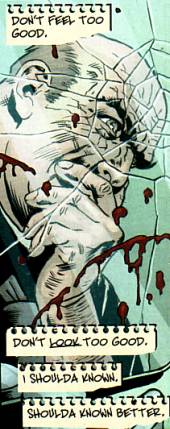
November 24, 2008
 Critic’s Notebook: A Random Thought Or Two About DC’s Final Crisis Series
Critic’s Notebook: A Random Thought Or Two About DC’s Final Crisis Series


Thanks to a local shop's dollar box, I recently read issues #2, #3 and #4 of DC's latest (and potentially last) multiverse-spanning crossover
Final Crisis. While I still don't care all that much for the series, it occurs to me that I may have been looking in the wrong direction for the source of my dissatisfaction. The more I read the more I'm convinced that writer Grant Morrison and his co-collaborators, particularly J. G. Jones with his skill in making the human figure the language of a narrative, manage to communicate a hopelessness brought about by a triumphant evil -- both because it won't stand and fight and because evil's already won -- called for by the story. The disorientation and occasional ugliness of the series really comes through in the newer issues, more so in #s 2-3 than the more perfunctory #4. Where it's going from there is somewhat of a mystery. I'm unimpressed with the idea seemingly floated that the Anti-Life Equation has fascistic overtones. That doesn't seem to me as compelling as Jack Kirby's treatment of it as something beyond the desire of any single actor in his stories, something that the agents of traditional comic book evil
and the act of resisting those agents strengthen in equal measure. But who knows? There's still a lot of room in the series for ideas to be unpacked, and that's a good candidate for further explication.
Where I now see the primary weakness of
Final Crisis is that the DC universe itself isn't vital enough or interesting enough or dependable enough as a starting point or filled with enough creative energy for me to give a crap as it all slips away. It's hard to take seriously a crisis paired with an adjective, even an alarming one. A greater sense of peril was engendered by
one of Fred Sanford's heart attacks. That's only half of it, though. Writers like Morrison having to build a castle of meaning before setting to it with cannons tend to slip into a balancing act that favors the church of collective memory over the reality of the monthly in-and-out grind. The best manage to suggest the latter feeds the former. It's hard to muster even that simple act of veneration when the powers-that-be hit the reset button and, worse, its conceptual re-configuration cousins, like so many hopped-up mice desperate for cheese. Something along the lines of Mary Marvel deteriorating into a crazed, hyperviolent super-villain might have been a wrenching thing for fans to see in 1948 or 1968 or even 1988. It isn't anymore, particularly not when it's just been done to goofier, duller effect over the last year. The best scenes in
Final Crisis concern the newer or more obscure characters, I think because they're largely free of the exhaustion and fuss to be found whenever DC pays attention to you for a couple of years at a time. In that light, New God Orion's apparent death in other comics leading into
Final Crisis wasn't bad because it somehow violated some compact of continuity but because it made whatever continuity in which you care to invest yourself less special. I suppose there's subtext to be explored there, too, a suggestion that the actions of Grant Morrison's already-victorious denizens of Apokolips on Earth somehow represent or mirror the significant slide these comics have suffered as vehicles of wonder and imagination. But at best that makes the ride more clever. It doesn't make it more satisfying.
posted 7:00 am PST |
Permalink
Daily Blog Archives
November 2019
October 2019
September 2019
August 2019
July 2019
Full Archives


